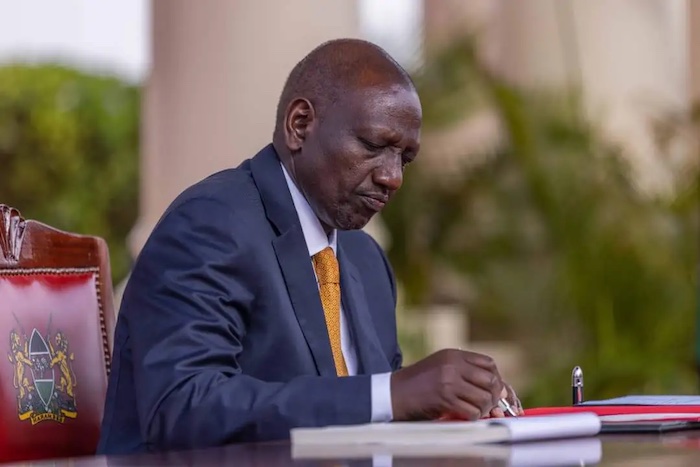President William Ruto recently assented to a series of legislative amendments aimed at reshaping Kenya’s tax, business, and revenue frameworks. These changes are intended to stimulate economic growth, protect local industries, enhance revenue collection, and support the financial well-being of citizens and businesses alike.
1. The Tax Laws (Amendment) Act, 2024
The Tax Laws (Amendment) Act introduces sweeping changes to Kenya’s tax system, focusing on employee relief, housing affordability, and multinational taxation. The deductible interest on mortgages has been increased from KSh 300,000 to KSh 360,000, enabling more Kenyans to purchase or improve residential properties. Contributions to the Affordable Housing Levy and post-retirement medical funds can now be deducted from payable taxes, reducing the risk of double taxation. Payments from registered pension funds will now be tax-exempt when received upon reaching retirement age.
A 6% Significant Economic Presence (SEP) tax has been introduced on multinational companies, while a minimum top-up tax ensures multinationals contribute fairly to Kenya's economy. Alcohol excise duty will now be based on alcohol strength rather than quantity. This means higher taxes for spirits and lower taxes for beer. Locally assembled electric vehicles (EVs) have been exempted from excise duty. Companies certified by the Nairobi International Finance Centre Authority will now pay a reduced Capital Gains Tax (CGT) of 5%, down from 15%. Additionally, the qualification threshold for investments was lowered from KSh 5 billion to KSh 3 billion. Alcohol manufacturers can now pay excise duty by the 5th day of the following month instead of within 24 hours, easing operational burdens.
2. The Tax Procedures (Amendment) Act, 2024
The Tax Procedures Act was revised to simplify compliance for small businesses and ensure clarity on electronic tax invoices. Invoices must now display "TAX INVOICE" as a label and include crucial details such as the supplier's and purchaser's names, PINs, serial numbers, and date/time of supply. Businesses with a turnover of less than KSh 5 million are required to issue reverse tax invoices, a mechanism that allows purchasers to raise tax invoices to verify tax liability.
To protect local steel manufacturers, import duty on some raw materials was reintroduced. This move is aimed at promoting local production, enhancing employment, and supporting the construction industry.
3. The Business Laws (Amendment) Act, 2024
This law seeks to boost financial stability, protect depositors, and improve the ease of doing business. The core capital requirement for banks has been raised from KSh 1 billion to KSh 10 billion. Non-compliant lenders face penalties of up to KSh 20 million or three times the financial gain from the breach. To cushion the industry, banks now have 8 years (up from 3) to meet the new requirement. The Central Bank of Kenya (CBK) will regulate non-deposit-taking credit providers, including “Buy Now, Pay Later” services, to protect consumers from exploitative practices.
Cabinet Secretaries now have the authority to set the minimum amount required for investments in Special Economic Zones (SEZs). Additionally, public entities can conduct business in SEZs, with investors assured of 10-year tax incentives.
4. The Statutory Instruments (Amendment) Act, 2023
This amendment aims to enhance accountability and enforce penalties for non-compliance in statutory instruments. If a Cabinet Secretary fails to submit a statutory instrument to Parliament, they are now required to publish a notice in the Gazette declaring the instrument a nullity. Parliament has been empowered to publicize nullified statutory instruments on its website and in two widely circulated newspapers. The penalty for contravening statutory instrument provisions has been increased from KSh 20,000 to KSh 1 million.
5. The Ethics and Anti-Corruption Commission (EACC) (Amendment) Act, 2024
Amendments to the EACC Act are aimed at strengthening the commission's leadership and integrity. The chairperson of the EACC must now meet the qualifications required to serve as a judge of the High Court. This move is intended to ensure experienced leadership and strategic direction at the commission. The amendments reflect the views and recommendations submitted by the National Dialogue Committee on governance.
6. The Kenya Roads Board (Amendment) Act, 2024
The Kenya Roads Board Act was amended to improve the governance of the Kenya Roads Board and streamline its membership. The number of board members has been reduced from eight to five, and the institutions eligible to nominate members have also been reduced. The term "Minister" has been replaced with "Cabinet Secretary" to align with the Constitution.
7. The Kenya Revenue Authority (KRA) (Amendment) Act, 2024
The KRA Act has been amended to enhance its operational efficiency and foster better revenue collection. The KRA Commissioner-General now has the power to appoint Deputy Commissioners, subject to board approval. The Treasury Cabinet Secretary has been granted the power to waive penalties for appointed agents who fail to transfer funds, provided the failure was inadvertent or beyond their control. The KRA will now strengthen its collaboration with educational institutions like the Kenya School of Revenue Administration (KESRA) to improve tax administration and capacity building.
These amendments aim to foster economic stability, support local industries, and enhance regulatory oversight in Kenya’s evolving business landscape.





